How to accelerate your cross-border eCommerce growth
September 2020
What can retailers do to unlock their international sales potential?
Every ambitious online retailer wants to increase sales volumes and revenue. For most, the greatest opportunities are in overseas territories. Cross-border eCommerce is increasingly a key revenue driver, allowing businesses to flatten seasonal fluctuations by increasing their reach of target audiences within key international markets to create a cross-border profit centre.
What is the UK’s current situation regarding international trading?
The UK formally left the EU on 31st January 2020, and as we are now in a transition period, both the UK and EU need to decide what their long-term relationship will look like throughout the remainder of 2020 and beyond. The UK will leave the single market and customs union at the end of the transition, and in an ideal world, a free trade agreement will allow goods to move between the UK and EU without checks or extra charges. If by 31st December 2020, an agreement is not made, the UK faces the prospect of having to trade with no deal in place, which means tariffs on UK goods and necessitates customs clearance support.
Throw in the recent pandemic, and it’s easy to see why it is becoming difficult for the UK’s 208,760 retailers to make critical plans for trading outside the UK. Despite these unfortunate events, eCommerce merchants should not stop selling internationally because to do so would be a great mistake.
How are current events impacting online retailers across the globe?
COVID-19 initially impacted online sales globally but has since rebounded. The pandemic has, in fact, driven further digital adoption in many countries and age groups, creating more opportunities for sales and reach than before.
Selling to overseas consumers can reap huge rewards, and foreign trade has many advantages. According to a recent study by Cross-Border Commerce Europe, the total online EU cross-border market represented a turnover of £98.28 billion in 2019, representing 23.55% of all eCommerce trading. Going forward, international sales are predicted to increase in sheer volume and as a proportion of all sales.
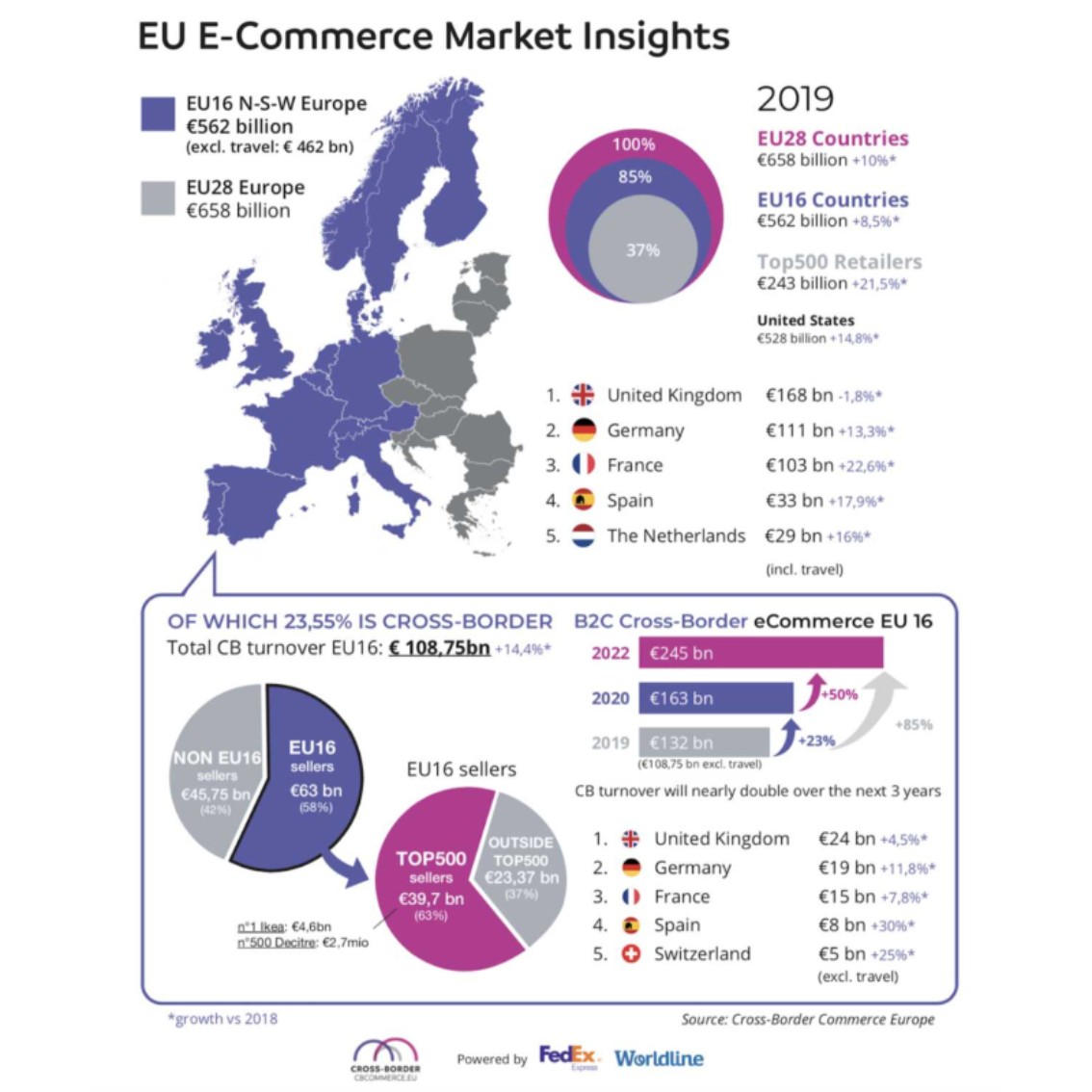
-
Despite the UK’s population making up 13% of the EU28 countries, the UK’s eCommerce market represents a staggering 25.5% of all the EU28 countries, making it the largest eCommerce market in Europe. This huge market share speaks volumes about the UK’s relative disposable income and propensity to shop online. It also means there is so much more business out there for UK retailers who aren’t shipping internationally to tap into.
-
Looking outside of the European Union, the UK’s eCommerce market represents 10.5% of global eCommerce trade.
-
Regarding international sales, the global cross-border B2C eCommerce market was £452.8 billion in 2018 and is expected to reach around £3,912 billion by 2027, growing at a Compound Annual Growth Rate of 27.4% between 2019 and 2027.
Retailers, brands and wholesalers should explore selling to international markets to create more significant opportunities for growth. This can be achieved by offering a broad range of global parcel delivery options, flexible payment methods and a clear and concise returns process. Furthermore, offering streamlined eCommerce customer service tailored towards helping international online shoppers and selling on overseas marketplaces such as MercadoLibre will help you tap into new markets and mirror the performance of your global competitors.
What do overseas consumers want?
Whistl conducted a research study to understand more about consumers’ international buying habits in six countries (Australia, France, Germany, ROI, UK, and USA), to give more insight into these activities and thoughts on purchasing from abroad.
The survey was conducted between 25th and 29th March 2020. To obtain a nationally representative sample of adults, we surveyed 1,200 adults, split equally between the UK, the Republic of Ireland, Germany, France, Australia, and the United States.
In this study, Whistl found that each country differs significantly in their buying behaviour and shopping preferences. The study found that 30% of purchases were made from international countries in the past month.
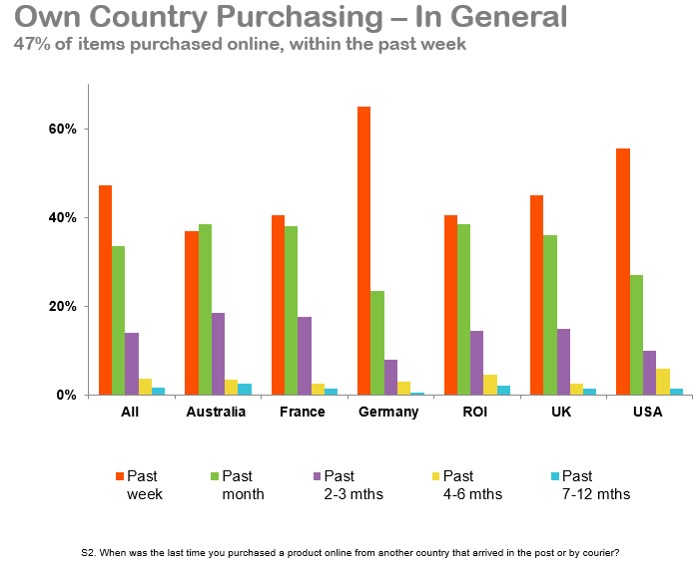
While Germany had the highest proportion of online shoppers buying domestically (over 90% in the past three months), Ireland had the highest proportion of online consumers shopping from overseas retailers.
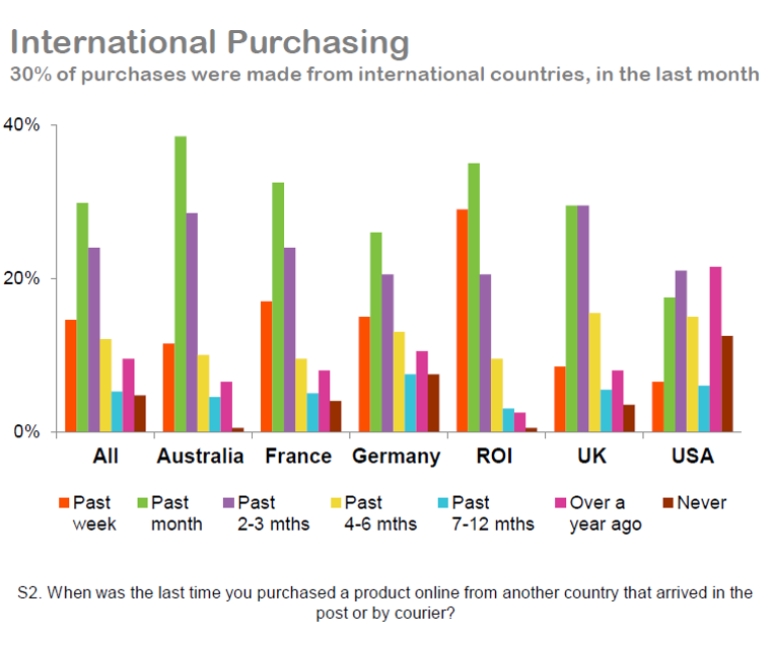
Therefore, it is crucial to analyse your customer base by country of origin to determine whether your marketing strategy is geared towards maximising sales from your most opportunistic markets.
Which international markets hold the most significant opportunities for cross-border eCommerce growth?
Trying to figure out which are the best countries to export to? Understanding what drives consumers to buy from abroad is a sensible place to start. In our study, Whistl found that cost saving is the most popular reason, followed by product availability.
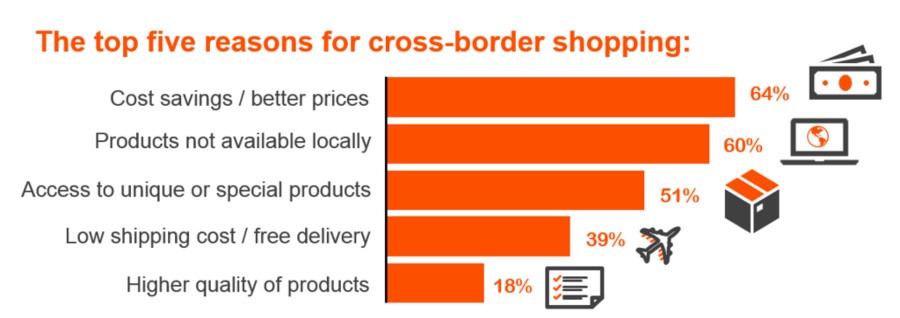
The same study also found that these variables differ depending on the respondents’ ages and demographics. For example, we found that 18- 39-year-olds rated access to better technology +65%, higher product quality +50%, and earlier product access +45% more than the 60-79 age group.
The next step we recommend is that you review your product range against the cross-border markets and biggest eCommerce industries with the most potential.
In the Whistl study, we found some consistencies across all foreign markets. Men were more likely to buy electronics and sporting goods, whereas women preferred purchasing clothing, household and beauty products. This bar chart will give you an idea of overall category popularity:
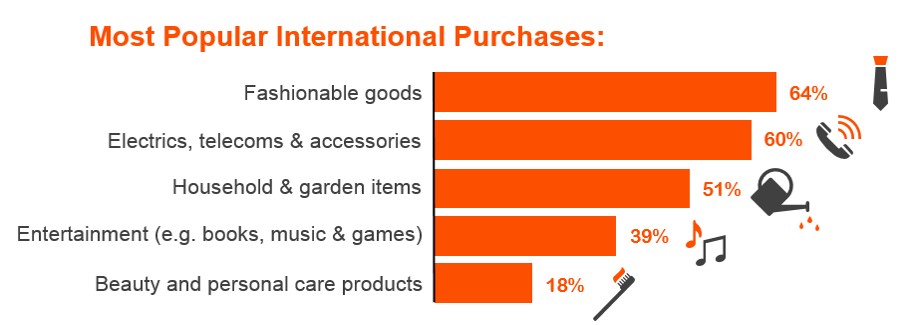
While it’s helpful to understand global trends, deeper analyses on a country-by-country basis reveal greater insights into consumer preferences:
-
Shoppers in the Republic of Ireland bought more clothing, shoes, and accessories than the other countries surveyed as beauty/healthcare and entertainment products.
-
France purchased a higher percentage of telecommunication and electric items but significantly fewer healthcare products than the other five countries surveyed.
-
Shoppers in the UK and Germany were less likely to purchase beauty and personal care products from abroad.
-
American shoppers bought fewer household and entertainment products from international markets.
Why do international shoppers buy from the UK?
While the UK’s biggest export markets are the USA (15.7% share of all exports), followed by Germany (9.9%), China (6.9%) and France (6.6%), globally different countries show different preferences; Whistl analysed the UK and overseas online shoppers’ preferences, to determine which markets are most famous for cross-border purchases. For five of the six countries surveyed, China was the most popular international market from which consumers bought, followed by the UK and the USA.
But why do international consumers choose to buy from the UK? The UK is regarded as ‘leading the world’ in online retail. However, the Whistl study also found that the UK is consistently the second most popular market for international consumers. This applies to key markets, including clothing, electronics, household goods, entertainment, food, and wine.
China edges ahead of the UK in popularity for international sales, but only just. Thanks to the UK’s strategically advantageous geographical location and consumers’ love for British goods that are synonymous with quality, the UK can compete on level terms. This is despite China’s population being nearly 21 times its size!
This is great news for eCommerce retailers looking to target and gain customers in the UK market. With the right digital strategy, product sourcing and cross-border logistics partner, your goods can easily be imported into the UK and delivered directly to your customers' doors.
What is preventing international consumers from buying from you?
In the Whistl study, we asked 1200 respondents (200 per country) and found that high delivery cost was the most common reason consumers don't buy from abroad. This was followed by the complexity of returns, low quality of goods, and delivery time, which took too long. The more you can minimise consumers’ anxieties when shopping online, the higher your conversion rate will be.
Despite all the fears surrounding the coronavirus, only 4% of respondents cited the pandemic as a reason they wouldn’t buy from abroad. It is more critical to xenophile online shoppers that you get the fundamental mechanics of the customer experience right, tailored to their locale, in a way that eases their anxieties.
This study has highlighted the importance of getting every component right in the consumer buying journey to maximise sales from international consumers. As detailed in the graph below, you need to mirror the customer experience of overseas competitors. It is also important that you ensure your customer service, delivery, and payment options, along with your website content, are tailored to the international customer.
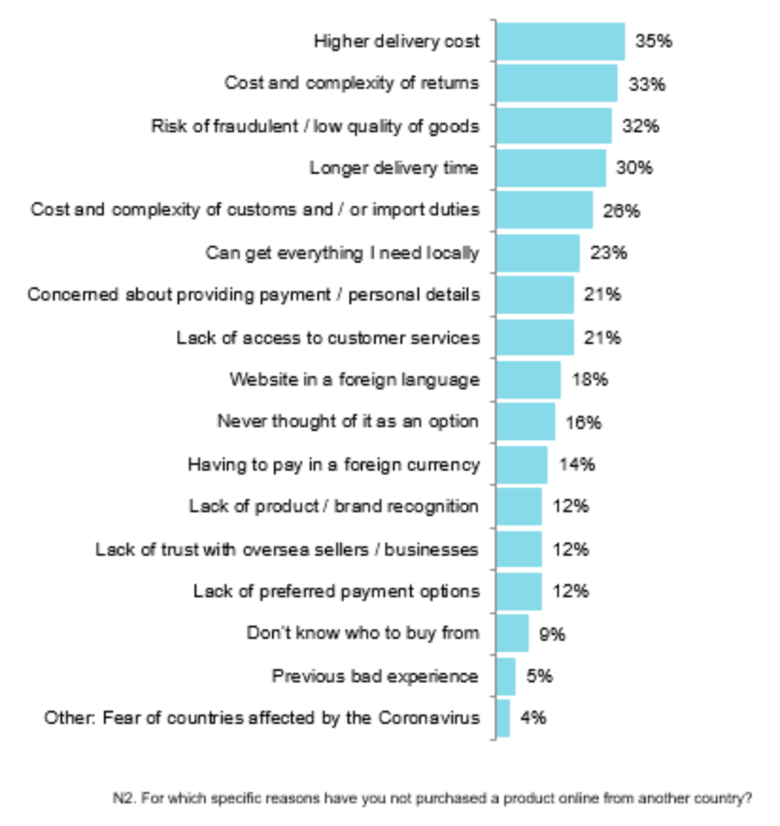
How can you unlock sales potential in some key markets
-
Australia - With 39% of shopping online in the last four weeks, Australian consumers are comfortable buying overseas and prefer eBay to other marketplaces. Australian consumers are comfortable with a lengthy delivery window but are frustrated by customs clearance processes and poor returns procedures.
-
France - 77% of French consumers shop on Amazon, followed by AliExpress (29%) and eBay (27%), so utilising these marketplaces makes sense. With around 150k Brits living in France, it is unsurprising that in a recent consumer research study, the UK was voted the second (China was first) most popular destination for online purchases from French residents. While eCommerce penetration is a low 52% (in European terms), it is a precious market. 66% of French consumers shop with overseas retailers for better prices. However, as with Australia, the French strongly dislike excessive customs procedures.
-
Germany—With 140k Germans living in the UK and 140k UK citizens living in Germany, there is already a lot of cross-border trade between the two nations. While Germans are the most likely to shop domestically, we found German consumers want better prices, the latest products, and unique items, and they are no longer limited to local markets.
-
Republic of Ireland (ROI)—Irish consumers are particularly fond of shopping online for clothes from international retailers, purchasing most frequently from their closest neighbour, the UK.
Irish consumers use Amazon (67%) and eBay (42%). To capitalise on Irish sales potential, Whistl recommends prioritising selling on both marketplaces while ensuring seamless customs and returns processes.
-
USA—If you’re exporting to the USA from the UK, it’s important to note that 66% of US consumers are concerned about longer delivery times with international orders. Moreover, 45% are disappointed with overseas retailers’ complex returns procedures. To maximise your eCommerce growth in the US, we recommend selling on eBay and Amazon and partnering with an international delivery management company.
What is the future of cross-border online shopping?
When exploring whether to expand your business internationally, you need to consider where your products are most likely to succeed, alongside the buying habits and trade restrictions in those economies.
There are a broad range of reasons that deter consumers from buying abroad; however, these can be easily remedied. Despite some reluctance to shop online internationally, this has not stopped cross-border trade from building a greater share of all commerce.
Furthermore, consumers have increased their overall adoption of online commerce, particularly in older age segments. With the decline of brick-and-mortar retail, this is unlikely to change for the foreseeable future.
As international trade and the shift to eCommerce increase, so will the opportunity's size. With the right international delivery partner specialising in border clearance, parcel delivery and contact centre services, you can maximise your cross-border sales.
Finally, a robust returns process is clearly of paramount importance. Having a delivery partner who can make this process seamless will ensure your customers are more likely to give positive feedback, make repeat purchases, and recommend your offering to their peers.
At Whistl, we help mid-market retailers with direct and indirect eCommerce exporting. All of our services are tailored to your needs, and with a wide range of solutions, we are well suited to maximise your delivery performance and enhance your customer experience.
Get in touch
Contact Whistl to discuss how we can help you accelerate your cross-border expansion.
Share this article



